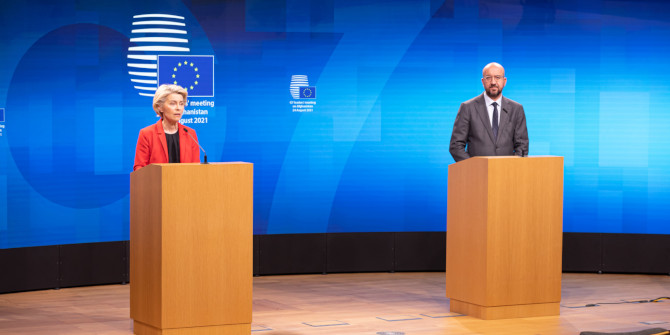The threat of climate change has prompted businesses across Europe to adopt more sustainable practices. But do these approaches go far enough? Sergio Scandizzo argues that while it is tempting to believe there is a sustainable solution to every problem, the language of sustainability often obscures the true scale of the environmental challenges we face.
We live in a myopic world. The strategic horizon of politicians in democratic countries is the next election, if not just the next opinion poll. CEOs of listed companies are driven by projected and realised quarterly results. Our attention span is progressively narrowing, and we now use “long term” to refer to anything (projects, loans, policies) with a duration that exceeds a few months.
Yet, at the same time, we seem obsessed with the notion of eternity, with the idea that whatever we do or have should last forever. Every government places growth – of GDP, income and exports – at the core of its programme and is then routinely judged on how well it delivers on these growth promises.
That growth on a finite planet cannot physically go on forever does not seem to be a relevant consideration. On the contrary, faced with unmistakeable signs that our planet’s resources are indeed beginning to dwindle, we have come up – as Matthew McConaughey’s character in The Wolf of Wall Street puts it – with another brilliant idea.
The quest for sustainability
This idea is the notion of sustainability. The word “sustainable” can be placed before virtually any concept: sustainable finance, sustainable growth, sustainable supply chains, sustainable energy. We have sustainable clothes, sustainable cars, sustainable holidays, and even sustainable ice creams. But what does it actually mean to call something sustainable in these contexts?
The word itself comes from the Latin sub (below) and tenēre (to hold). It conveys the idea of bearing, of maintaining or keeping up something for some length of time. When it comes to growth, of course, indefinite growth is impossible, as Vaclav Smil persuasively explains. And the pace of economic growth that most governments around the world advocate requires an ever-accelerating extraction of resources, environmental degradation and consumption that is likely to ensure an early and painful interruption of the growth process itself.
In awareness of this conundrum, the Brundtland Report of 1987 defined the concept of sustainable development as “development that meets the needs of the present without compromising the ability of future generations to meet their own needs”, and again, recognising the fundamental link with the social dimension, noted that “even the narrow notion of physical sustainability implies a concern for social equity between generations, a concern that must logically be extended to equity within each generation.”
The definition of “sustainable finance”, although less straightforward, is nevertheless a little more concrete. The European Commission provides the following: “Sustainable finance generally refers to the process of taking due account of environmental, social and governance (ESG) considerations when making investment decisions in the financial sector, leading to increased longer-term investments into sustainable economic activities and projects.”
A recent book on the subject follows the same line of thinking. “Sustainable Finance looks at how finance (investing and lending) interacts with economic, social, and environmental issues. In the allocation role, finance can assist in making strategic decisions on the trade-off between sustainable goals. Moreover, investors can exert influence on the corporates in which they invest. In this way, long-term investors can steer corporates towards sustainable business practices.”
Two things stand out from both definitions: that sustainable finance is more an attitude than an activity (it “refers to the process”, “looks at how”), and that in order to define it, we need in turn to provide a definition of sustainable “activities” or “business practices”.
The role of governments
The European Commission does indeed provide one such definition, for the specific instance of environmentally sustainable activities. Sustainability in that context refers to a combination of criteria for deciding whether an activity contributes to a set of environmental objectives. In other words, to practice sustainable finance means to contribute to the allocation of resources towards activities that in turn foster certain predefined goals. In this interpretation of the word, however, sustainability no longer refers to maintaining economic growth (or any other process) for an indeterminate length of time, but rather to an ability to contribute to certain common goals.
By extension, sustainability should not be measured against a loose combination of disparate targets, from emission levels to recycling percentages, from labour law compliance to gender equality measures, as the methodologies employed by various rating agencies suggest. Rather, it is a measure of a company’s contribution to specific public goals that are set at national or international level through the relevant political process.
To many this smells a lot like government intervention in the economy. However, as Milton Friedman eloquently argued in a famous 1970 editorial for the New York Times, it is indeed only the government, implementing the wishes of the public, that has the right to impose taxes and decide how those should be spent. The corporate executive is merely an agent of the shareholders and has no right to devote arbitrary shares of a company’s profit to equally arbitrary environmental or social goals.
The same holds for consultants distributing ESG “ratings” or “labels” based on discretionary standards. After all, would you feel safe walking around if driving licences were handed out by private outfits each using its own subjective examination criteria? Paradoxical as it may seem, old Europe’s case for government-driven sustainability comes from the most classical of American liberals.
Clear-eyed solutions
If Europe is to manage a future of declining resources, it will be necessary to confront this challenge with our eyes open. There can be no illusions that growth can be achieved indefinitely, but we can and should have clear social and environmental goals that are democratically identified and prioritised.
The notion that existing approaches to finance, growth, supply chains, and energy can simply be made sustainable risks obscuring the stark reality of the environmental challenges we face. Our only hope of reaching clear-eyed solutions to these problems is to look beyond the language of sustainability and recognise that infinite growth is incompatible with the finite resources of the planet.
Note: This article gives the views of the author, not the position of the European Investment Bank, EUROPP – European Politics and Policy or the London School of Economics. Featured image credit: Jason Blackeye on Unsplash






It is very good to see the issue of genuine sustainability being properly discussed. Achieving this is just as important as halting anthropogenic climate change, and almost equally urgent, yet it receives near zero attention by comparison. It is indeed also important, when considering appropriate controls over unsustainable behaviour, to define precisely what is meant by ‘sustainable’, but in ordinary parlance an activity is not sustainable unless it can be carried on for the indefinite future without long-term adverse impacts on anyone or anything else. What the indigenous peoples of the Amazon rain forest have learnt to do, and what Bolsonaro encourages most certainly is not. It follows that there are no degrees of sustainability, or of being more or less sustainable: an activity either is sustainable or it isn’t. It may however be less unsustainable than others, and that is the most that advertisers should generally be able to say.
A book on the subject that I strongly recommend is “Natural Capital ” by Dieter Helm (Yale, 2015), who is Professor of Economic Policy at Oxford. He defines sustainability by reference to the planets’ ‘natural capital’, both renewable and non-renewable, but principally the former, which consists of all those assets which naturally renew themselves if allowed to do so, such as fresh water, fertile soil and the whole gamut of biodiversity from all marine life, animals, plants, insects, and the micro-organisms that are essential to these. In essence, he applies a balance sheet approach in his definition of sustainability, which demands that the aggregate level of all renewable natural capital should be kept at least constant, and preferably be enhanced. He formulates further provisions to deal with the depletion of non-renewable natural capital, such as metal ores and fossil fuels. One he calls a ‘strong’ rule, which requires that the value of economic rents from the depletion of non-renewable natural capital should be invested in renewable natural capital. His alternative ‘weak’ rule merely requires that there “should be general capital compensation for the depletion of non-renewables.
Note that this approach does not require a valuation of the entirety of the planet’s natural capital, but merely the assessment of changes in the total, which are appreciably more accessible. His book addresses how to approach this task, and it has been supplemented by various reports of the Government’s Natural Capital Committee, of which Helm was the Chair, which were issued from 2012 to 2020, when the Committee was wound up.